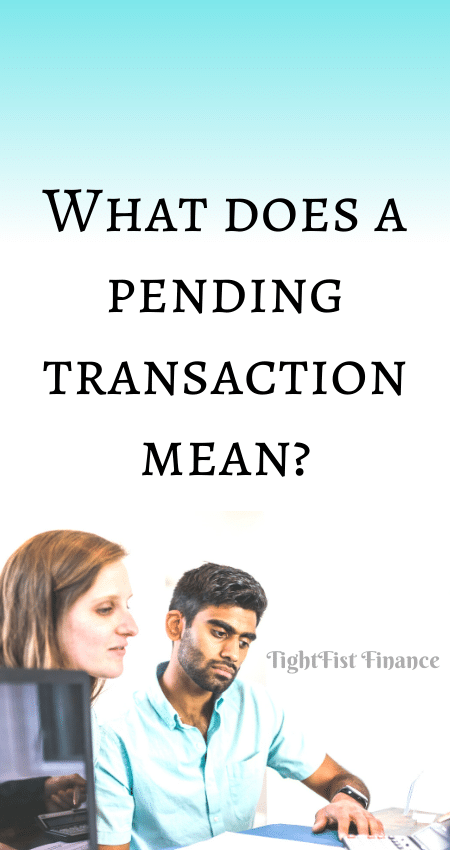What does a pending transaction mean?
A pending transaction means a card has been charged, but the payment has not been processed. The charge shows as pending, but the money is not available for spending. A pending transaction is typically resolved within 2-3 business days, but can take 7 days.
Imagine, getting the pending charge resolved or actually being able to know how much money is in your account.
Understanding pending transactions can help you eliminate stress and make decisions.
Luckily for you, I’ll show you what a pending transaction is and when it will go through. I’ll show you what to do if you suspect fraud and how to stop a pending transaction. You’ll be a master at pending transactions by the end of this article!

This article may contain affiliate links which pay a commission and supports this blog. Thank you for your support!
What does a pending transaction mean?
A pending transaction means a card was used for a transaction, but the payment has not been processed. Your bank account will show the transaction as pending and you should allow up to seven days to complete.
Does a pending transaction mean it went through?
A pending transaction does not mean the payment went through. Showing a pending transaction only indicates a payment is attempting to be performed. Most transactions will be approved, but a transaction can be canceled, expired, or denied.
You should not try to spend money that shows as pending because the funds are not available. Trying to spend money that shows as pending can result in overdraft fees. Instead, check your available bank account or credit balance to see how much money is available to spend.
Why would a transaction be pending?
Transactions show up as pending because the money is considered to be on hold. Merchants may wish to verify your account has the available funds to complete the transaction. Additionally, a transaction would show as pending if the charge was made outside of business hours.
For example, you might generate a transaction for $100. The merchant may need more time to verify the funds are available for withdrawal. Having only $50 in your bank account might result in the transaction being canceled for insufficient funds.
Transferring money to your brokerage account for investing can result in a transaction showing up as pending. You submit an ACH bank transfer request on Saturday for $1,000, but the stock market and brokerages are closed. Therefore, your transaction would show as pending until the next business day, Monday.
Are pending transactions already deducted from my bank account?
Pending transactions are accounted for by viewing your bank account’s available balance. Your available balance is the amount of money you currently have available to spend.
For example, you might check your bank account balance and see ‘balance’, ‘pending’, and ‘available balance.’ Your balance might show $100, but you just spent $20 on dinner which has not been processed and shows as pending. Therefore, your available balance would be $80, meaning you have $80 available to you.
How long does it take for a pending transaction to go through?
Pending transactions are typically resolved within 2-3 business days. However, it can take up to 7 days for a pending transaction to go through. The time it takes to process a pending transaction is dependent on the merchant.
Why do pending transactions take so long?
Pending transactions take a long time because it is dependent on the payment processor to process the payment. In most cases, transactions are processed in batches during certain times of the day. The processor may need to verify funds or the transaction was performed outside of normal business hours.
When do pending transactions go through?
Pending transactions typically go through within 2-3 business days. A pending transaction can take up to 7 days. Contact the merchant if the pending transaction has not gone through after 7 days.
What to do if a transaction is pending
A pending transaction that remains in pending status can be resolved by contacting the merchant. You can also stop a potential fraudulent charge that shows as pending by contacting the merchant or card issuer.
Can I stop payment on a pending transaction?
You can stop payment on a pending transaction by contacting the merchant. A charge that has gone through can be resolved by contacting your bank or card issuer and disputed.
What happens if a pending transaction expires?
Pending transactions that expire will return the money back to the originating account.
Summary: What is a pending transaction?
As you can see, a pending transaction is a hold on funds that are already spoken for. You are able to spend your available balance, but not the money that is pending. Typically, a pending transaction is resolved in 2-3 business days and can take up to 7 days.
Transactions are typically pending because the merchant wants to verify money is available or the charge was outside of business hours. The payment should be processed once money is available or the next business day.
Charges can get stuck as pending. To resolve a pending charge, contact the merchant that issued the charge. A charge that goes through and is suspected fraud can be disputed by contacting your bank or card issuer.
